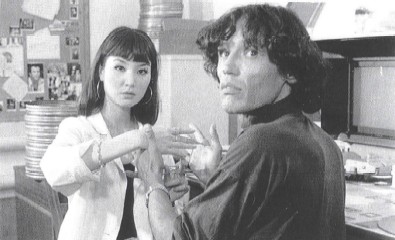

Darezhan Omirbaev's most recent film, The Road, openly celebrates its love of filmmaking. Not only is the film dedicated to Kazakh filmmakers, but its central hero, Amir Kobessov, is a filmmaker who is played by another Central Asian film director, Dzhamshet Usmonov (The Flight of the Bee, 1998). Amir awakens from an anxiety nightmare: during the preview of his newest film, the projectionist mixes up the reels and begins to show a bad karate film by accident. Although Kobessov objects to the mix-up, the public is ecstatic and refuses to allow the projectionist to interrupt the screening to show Kobessov's film.
The visual nightmare is framed by two written texts: a love letter from his wife, Anara, and a telegram informing him that his mother is dying in the remote provincial village where he was born and raised, but about which he has long stopped remembering. When he learns of his mother's illness, Amir leaves his wife and young son, his urban life and his filmmaking career to journey back to his past.
The film is a classic example of a "road movie," where Amir's movement through space (the Kazakh steppes) allows him to review the time of his life's journey. Amir's past, however, does not lie in the distant village of his childhood. Instead, his "past" is ruled by two obsessions: sex and cinema. During the drive Amir recalls the footage he and his assistant were editing: the shots, the assistant's touch, his desire, his wife's blaming look when she catches them. His sense of shame leads him to review the shots he and his assistant were watching on the editing table just before his wife walked in on them: a cut between a young actress playing a romantic scene and a naked, rear view shot of her double. Though the actress protests that this cut will bring shame to her at home and to her village, Amir insists on retaining it to maintain the film's integrity.
As if to convince himself of his artistic dedication, Amir repeatedly rehearses a scene from his newest film in his mind until he gets it perfect: a young man shoots an older man who is reading a newspaper (a scene that closely parallels the murder in Omirbaev's preceding film, Killer)
Amir's thoughts rarely return to his mother or the distant past, and even when they do, these recollections are marked by the absence of connections and closures. Amir is simply cut off from his past, whether that past is heroic (his vision of ferocious Mongol warriors) or domestic (his memory of watching the moon landing on television while his mother was busy milking). Not surprisingly, by the time he arrives at the village, his mother has already died. Amir has once again failed to connect, just as he failed to meet up with the sexy waitress, with whom he had set up a rendezvous. He arranges his mother's funeral, spends the night, finds and reads the love letter from his wife, and sets off again for Almaty.
Omirbaev's "road movie" invokes all of the genre's conventions and, at the same time, repackages them: self-rumination does not guarantee self-transformation and recollection is not a preamble to purification. Amir's journey home is simply a return to his already formed present, which has been graphically demonstrated to the viewer.

Darezhan Omirbaev was born in 1958. In 1980 he graduated from the Department of Applied Mathematics at Kazakh State University. In 1984 he was accepted in Sergei Solov'ev's master class at the State Film Institute (VGIK), but left shortly afterwards. In 1987 he graduated from the film history and theory section of VGIK, where he focused on structuralist film analysis. From 1987-1989 he was editor of the journal New Film.
| 1988 | Shil'de (short) |
| 1991 | Kairat |
| 1993 | Profession: Controller (documentary) |
| 1995 | Cardiogram |
| 1998 | Killer |
| 2001 | The Road |